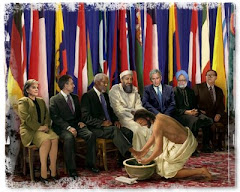picked this up off of greg boyd's blog. interesting to think about, and pretty much in line with how i think about this stuff.
the following is greg boyd's synopsis of Jacques Ellul's the subversion of christianity.
Ellul's basic thesis is that the Kingdom Jesus inaugurated with his life, death and resurrection has been subverted, how you ask? please read the below:
* SUCCESS. The Kingdom only works when it's lived out in small numbers. Once it becomes a mass movement, it becomes an ideology and loses its soul.
* MONEY. A movement that was founded on people renouncing all possessions got seduced into sanctifying the "right" to possessions.
* MORALITY. This is a huge point. Ellul totally gets that eating from the Tree of the Knowledge of Good and Evil is judgment and is at the root of all sin (see chapter IV). The Kingdom revolution is a revolution of the Spirit -- which is the antithesis of living on the basis of ethics. He continually stresses that the New Testament and the early Jesus-movement "has no morality." Once Christianity became a ruling power and a successful mass movement, however, it had to control people with rules.
* RELIGION. The Jesus movement is anti-religious. But people crave religion. They have "religious needs" that the Jesus movement undermines. When the movement became a mass movement, it became a Christianized version of pagan religion.
* PRAGMATISM. The Kingdom was founded on the singular concern to be faithful to God, not a concern to fix the world. Once Christianity became successful, however, it wrongly assumed responsibility to rule the world and got practical. Since most of Jesus' teachings are impractical, they had to be set aside.
* VIOLENCE. Non-violence never seems practical, so it was among the things that needed to go. (Here Ellul curiously argues that the example of Islam was the main influence in making Christianity a violent religion, see Chapter V).
* POLITICS. Here Ellul is at his best, showing how Jesus' apolitical/anti-political movement was transformed into the handmaiden of politics. He shows that Christianity has almost always pathetically given divine sanction to whatever political regime it found itself in. Using ingenious theological arguments right out of the Bible, the Church defended the monarchy when it found itself under a monarchy and the Republic form of government when under this type of government. So too, it defended Socialism under Socialism, Communism under Communism and of course Democracy under a Democracy. The movement whose heart is to revolt against all government to manifest the reign of God is reduced to a silly defender of whatever government happens to be in charge.
* POWER. The heart of the problem, Ellul argues, is that we fear the freedom the Kingdom offers us. It's the radical freedom of possessing nothing -- including power. We rather crave the security of things, of power, of rules, and of pretending we are free (e.g. by having a vote) when in fact we are in bondage. The Spirit was to set us free, but this requires relinquishing all these things.
Tuesday, January 15, 2008
Subscribe to:
Post Comments (Atom)



1 comment:
So how much more do we have to define the problem? I agree with Ellul to the extent of what I read in your post. I suspect it is akin to "Pagan Christianity" that is a new book authored by Frank Viola and George Barna I have ordered and will read. The implications of these and other assertions are profound. Who, what, when, where, how are we to respond? Can we talk about this over coffee some day?
Sorry, I lost my head again. Thanks for sharing.
George
Post a Comment